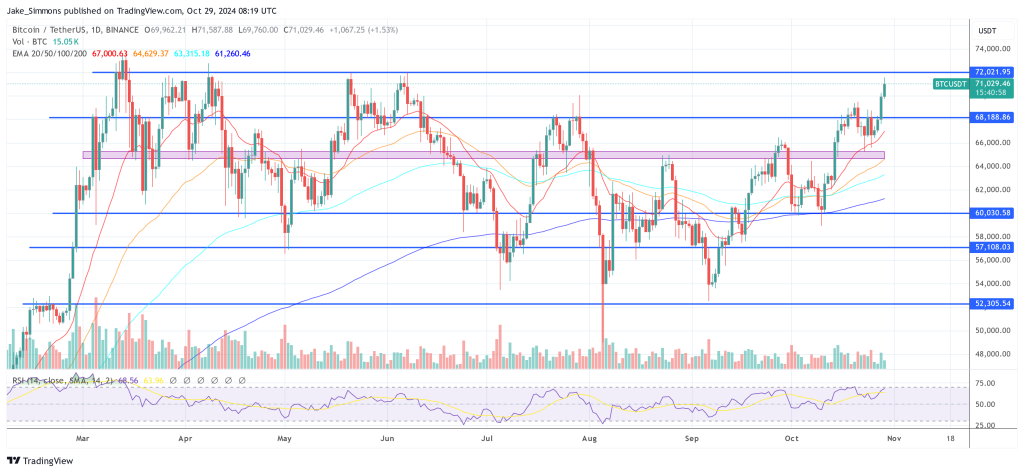In an appearance on CNBC’s “Squawk Box,” Matthew Sigel, Head of Digital Assets Research at investment firm VanEck, forecasted a significant shift in global trade dynamics with the potential adoption of Bitcoin by BRICS nations. Sigel’s insights come amid growing fiscal policy concerns in the United States and increasing efforts by emerging economies to circumvent traditional financial systems.
“We think once the election result is finalized, Moody’s is going to downgrade US sovereign debt, and that could be a catalyst for Bitcoin,” Sigel stated. He emphasized BTC’s unique properties, noting, “Bitcoin is a chameleon. It’s hard to predict what it’s correlated with. Because of the 21 million and fixed amount out there, it’s a non-US asset.”
BRICS Will Adopt Bitcoin: VanEck
The BRICS bloc—comprising Brazil, Russia, India, China, and South Africa—recently expanded to include five new members: Egypt, Ethiopia, Iran, Saudi Arabia, and the United Arab Emirates (UAE). This expansion increases the bloc’s combined GDP to surpass that of the G7 nations.
“BRICS had a conference in Russia; there’s six new members, so their GDP is greater than the combined GDP of G7,” Sigel stated. “Of the six new members, three of them—Argentina, UAE, and Ethiopia—are mining Bitcoin with government resources. There’s urgency outside the US to find a way to circumvent the fiscal policy here in the US.”
Russia is taking concrete steps to bolster its BTC mining infrastructure. The country’s largest data center operator, BitRiver, has partnered with the Russian Direct Investment Fund (RDIF) to construct mining and artificial intelligence computing facilities across BRICS nations. The partnership was announced at the BRICS Business Forum in Moscow on October 18, 2024.
“We will focus on creating a mining-based infrastructure—building data centers and connecting them to necessary power sources to enable AI project deployment and development across the country,” said BitRiver CEO Igor Runets.
Sigel pointed out Russia’s strategic moves: “Russia announced their wealth fund is going to invest in a regional fund to build Bitcoin mining throughout BRICS with an idea of settling global trade in Bitcoin.”
He suggested that future geopolitical shifts could lead to broader acceptance of Bitcoin in international trade. “Someday, I don’t know if it’s five years or ten years, Putin is going to die. We’re going to look to reintegrate these countries into the world system, and they’re trading in Bitcoin—what are we doing?”
Kirill Dmitriev, CEO of RDIF, echoed the sentiment of technological sovereignty: “The development of computing capacity for the implementation of artificial intelligence in various industries is a priority for Russia and the BRICS alliance partners. Joint use of high-tech infrastructure will let members reduce costs, cut foreign technology dependence, and control critical data.”
Notably, Sigel remains bullish on Bitcoin’s future value. “It’s going to be a $100,000 asset soon, $200,000. The smallest ever rally was 2,000%. If we do half of that, 1,000%, we would be at $180,000,” he projected. He anticipates that post-election fiscal developments in the US will serve as a significant catalyst for Bitcoin’s appreciation. “I think after the election will be a significant catalyst. You can see it on the front page of The Wall Street Journal talking about debt and deficit concerns. Moody’s is telegraphing this.”
VanEck has developed a long-term model predicting Bitcoin’s ascendancy as a global reserve asset. “We have a model that assumes by 2050—this is long term—Bitcoin becomes a reserve asset used in global trade and held at global central banks at a modest 2% rate, and in that model, we arrive at $3 million,” Sigel revealed.
At press time, BTC traded at $71,029.




